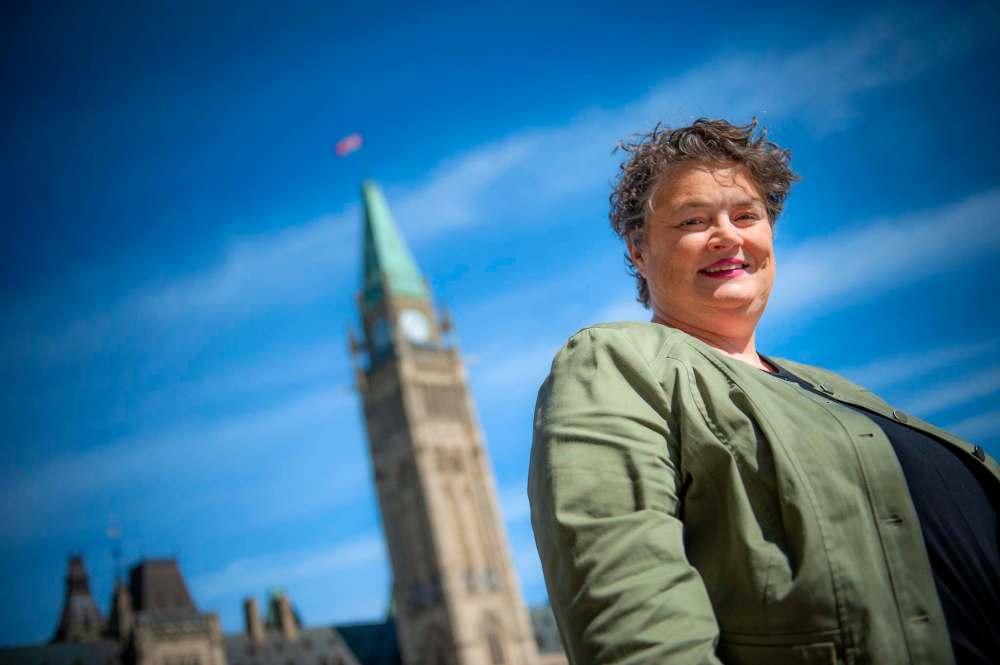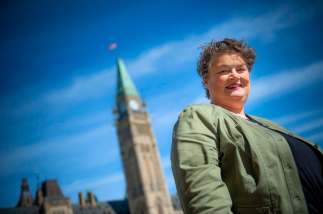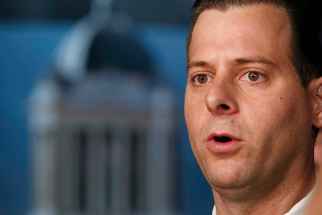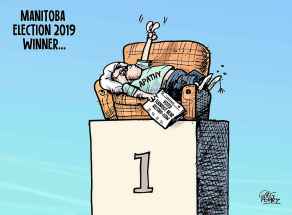Fighting spirit Former Manitoba MLA Howard helps steer federal NDP back on track
Read this article for free:
or
Already have an account? Log in here »
To continue reading, please subscribe:
Monthly Digital Subscription
$0 for the first 4 weeks*
- Enjoy unlimited reading on winnipegfreepress.com
- Read the E-Edition, our digital replica newspaper
- Access News Break, our award-winning app
- Play interactive puzzles
*No charge for 4 weeks then price increases to the regular rate of $19.00 plus GST every four weeks. Offer available to new and qualified returning subscribers only. Cancel any time.
Monthly Digital Subscription
$4.75/week*
- Enjoy unlimited reading on winnipegfreepress.com
- Read the E-Edition, our digital replica newspaper
- Access News Break, our award-winning app
- Play interactive puzzles
*Billed as $19 plus GST every four weeks. Cancel any time.
To continue reading, please subscribe:
Add Free Press access to your Brandon Sun subscription for only an additional
$1 for the first 4 weeks*
*Your next subscription payment will increase by $1.00 and you will be charged $16.99 plus GST for four weeks. After four weeks, your payment will increase to $23.99 plus GST every four weeks.
Read unlimited articles for free today:
or
Already have an account? Log in here »
Hey there, time traveller!
This article was published 13/09/2019 (2285 days ago), so information in it may no longer be current.
OTTAWA — Jennifer Howard is down for a fight. Five years after leading a cabinet revolt that reshaped the Manitoba legislature, she’s now setting her sights on taking the embattled federal NDP from turmoil to a legitimate contender by voting day.
“New Democrats are used to being underestimated,” Howard said Friday, taking a rare pause from her role at the helm of NDP Leader Jagmeet Singh’s campaign.
Howard is just the latest Manitoban who went from the halls of legislature to federal NDP backrooms, showing colleagues how to go from seeing themselves as the moral conscience to actually forming government. For decades, Manitobans have been integral to the federal NDP, dating to Winnipeg MP Stanley Knowles, who helped raise the party and introduce the Canada Pension Plan.

“You have a different view from Manitoba,” said David Woodbury, president of the Manitoba NDP, who spent the late 1990s steering the federal party’s finances and communications.
– – –
Howard entered federal NDP headquarters last November, by which point, both the party and the physical building it occupies were at risk.
The NDP started the 2019 election campaign with just 235 candidates for 338 ridings, days after two New Brunswick delegates defected to the Green party. The nomination process is particularly difficult for the NDP, which emphasizes diverse candidates and has fewer staff to vet social-media accounts for gaffes that can bring down the party brand.
The NDP is only slightly ahead of the Greens in fundraising, and ended 2018 in the red by $4.5 million, after borrowing against the building that is home to its Ottawa headquarters. It’s arguably the hardest hit by rules restraining union donations, as well as the cancellation of per-vote subsidies.
There have been other challenges. Canada’s unionization rate dropped in the 1980s and never recovered, depriving the party of its traditional supporters. Many of the party’s prominent MPs aren’t seeking another term.
And then, there’s the infighting.
Singh’s predecessor, Tom Mulcair, derided him in January for not keeping abreast of current events. Meanwhile, the federal party has clashed with its Saskatchewan electoral districts over the treatment of MP Erin Weir, whom the party removed last year for dismissing harassment allegations as politically motivated.
No stranger to such conflict, Howard said the key is finding a focus and keeping a cool head.
“Even through very deep disagreement, (you try to) remember to treat people in a humane way,” said Howard, who left Manitoba three years ago.
After serving as finance and labour minister, Howard was part of the November 2014 caucus revolt, when she and four other ministers resigned after losing confidence in then-premier Greg Selinger.
Two years later, the party suffered a humiliating defeat at the polls, ending a 17-year run in government.
“It taught me a lot about conflict and the cost of conflict. And I think I’ve used those lessons in my work since that time,” she said.
Part of that is resetting a narrative — especially after a weak first impression.
Singh only became a member of Parliament in February, 16 months after the NDP voted him as leader, in part due to Prime Minister Justin Trudeau calling a late byelection.
Polls show Singh made little progress making himself known outside the Ottawa bubble before winning his Burnaby South seat in B.C. Instead, his lack of clarity on Sikh terrorism and the 1985 Air India bombing curtailed the normal honeymoon period.
On Parliament Hill, journalists caught him flat-footed, at times turning to his colleagues at a podium to verify the party’s stance on the issue at hand.
Michael Balagus, who was chief of staff to Manitoba premiers Selinger and Gary Doer, is now advising Singh in a volunteer capacity. He said it reminds him of his time working for Parliament Hill’s first female leader, Audrey McLaughlin, who was at the NDP helm from 1989 to 1995.
“A lot of the challenges and criticism that she went through, and the intensity of them, were not dissimilar to what the first racialized leader of a federal party, Jagmeet Singh, is going through, as well,” Balagus said. “There’s an additional scrutiny.”
Howard compares Singh’s experience to her time as Manitoba’s first openly lesbian cabinet minister, after gay MLA Jim Rondeau was elected.
“Being the first of anything comes with added scrutiny,” she said, including from within the LGBTTQ+ community.
– – –
Since Howard took over the campaign last November, MPs have said they feel the party has more of a focus. Part of that is directing candidates to look beyond typical voting blocks, such as unions and young people.
“Nobody wins government just with people who agree 100 per cent with what you have to say,” she said.
“You learn when you have been part of a government… ways to talk about the things you believe in that include other people, and don’t exclude them.”
Woodbury said Manitoba NDP staff have gone beyond their federal cousins’ role as “the conscience of the Parliament” to actually governing through compromises and electoral politics.
“You also have that experience of being the conscience of the Parliament or the legislature, but also being able to be practical in a sense of being able to say, getting elected is important because it means we can do the thing for the people that we want.”
He said that in the past, NDP hands such as Les Campbell and Donne Flanagan, helped the federal party regain its focus, because of their time at the Manitoba legislature.
“A lot of the brain trust of this campaign has roots in Manitoba,” said Robin MacLachlan, vice-president at Summa Strategies.

He said provincial wings have done the hard work of balancing interests to form governments, which “puts the fire in the belly” to find a workable platform.
The former Parliament Hill staffer came through the NDP’s Nova Scotia wing, which only took government when it was able to get working-class coal miners and environmentalists on the same page.
MacLachlan sees a similar analogy to former leader Jack Layton’s delicate balancing of rural and urban voters during the long-gun registry debate, which put Churchill—Keewatinook Aski MP Niki Ashton under tight scrutiny for months.
“It sometimes causes friction,” said MacLachlan.
– – –
Singh’s campaign launch Wednesday was near-flawless in comparison to the other leaders.
Trudeau dodged questions about the SNC-Lavalin affair, Conservative Leader Andrew Scheer was pressed on Quebec’s hijab-ban Bill 21, while Green Leader Elizabeth May had to further clarify the party’s position on abortion and free votes.
At a Goodwill thrift depot in London, Ont., Singh had a confident posture as he unveiled his platform, alongside an analysis of corporate lobbyists’ visits with the Liberals, whom he accused of “pretty words and empty promises.”
In Thursday’s leaders debate, he landed lines that differentiated the NDP from the Greens, who are at loggerheads for third place.
The campaign won’t be seamless. After the Wednesday launch, a CBC reporter said she spoke with one of the people posing in the crowd behind Singh, a young voter who said she was pulled off the street and wasn’t sure what the NDP stands for.
Howard will have Singh highlight the shortcomings in what the Liberals pledged to accomplish. While unemployment is at historical lows, and baby-bonus cheques have undercut child poverty, wage growth remains stagnant, and people lack job stability and benefits.
The Liberals are appealing for another mandate with the campaign slogan “Choose forward”; the Conservatives have adopted it’s “Time for you to get ahead.”
The NDP is pledging to be “In it for you” and Howard said the key to delivering that message will be concrete initiatives such as lower mobile-phone fees and a “super-wealth tax” on multi-millionaires. Much like the party and its underdog status, the message is aimed at those who also considered themselves underdogs.
For example, in what should be a tight battle for the Winnipeg Centre riding, NDP candidate Leah Gazan is pointing to the incremental progress on Indigenous poverty in the hopes of unseating Liberal MP Robert-Falcon Ouellette.
“That is who we are; we fight for people that sometimes nobody else does fight for,” Howard said.
– – –
The NDP is targeting ridings that have underperformed economically and have less loyalty to any party, especially in Southern Ontario.
Singh will stay in regions for multiple days — the political spin is that this will help him plant roots, but realistically the party does not have the cash to charter its own plane.
The party is hoping to turn low expectations into an advantage by slowly growing momentum. The danger, though, is peaking too early and fizzling out in the campaign’s final days.
Howard’s hope is for a repeat of the 2011 campaign, in which Layton took the NDP from 19 per cent support to 31 per cent over the course of two weeks, with a sweep of Quebec ridings that put the party into official Opposition status.
“People were saying that we were irrelevant, and then things turned around in a dramatic way,” recalled backroom veteran Anne McGrath, who was Layton’s chief of staff. “Being written off at the beginning is not unusual for us.”
McGrath, who hails from Alberta, argues the NDP takes a straightforward tone in its messaging, shaped by Western Canadians’ penchant for plain speak.
“In the Prairies and in (B.C.), there have been more examples of NDP governments, and certainly that flavours the approach that you take to political life,” she said.
Howard said it’s time to take that to the national stage.
“I firmly believe that we will, one day, be the government of Canada,” she said. “We’re used to being underdogs.”
dylan.robertson@freepress.mb.ca
History
Updated on Friday, September 13, 2019 7:37 PM CDT: Final version
Updated on Saturday, September 14, 2019 3:13 PM CDT: Fixes typo











